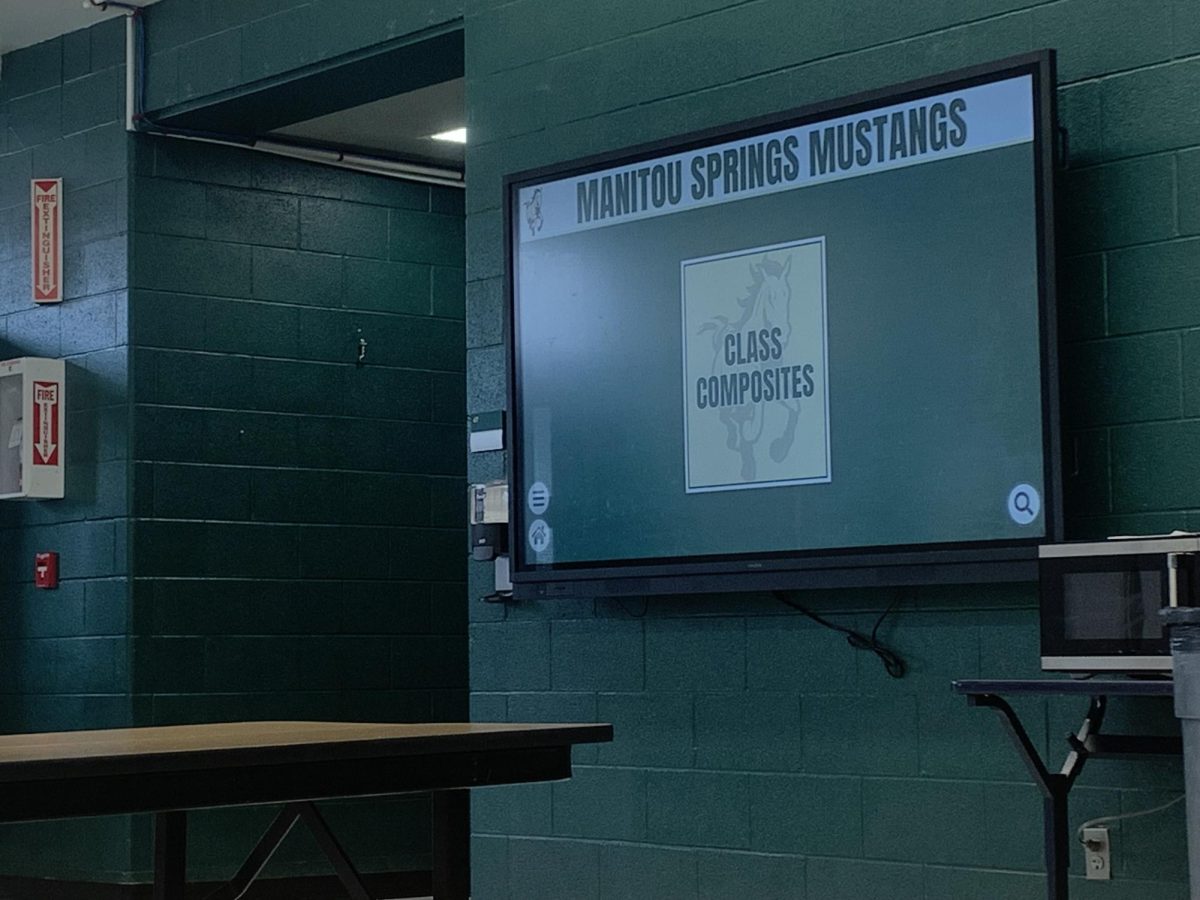Reaching Higher: the ins and outs of Manitou through the eyes of its most promising students
October 21, 2014
This is a time of remarkable levels of academic achievement here at Manitou Springs High School, both in terms of individual students and as a whole.
Recently, several high-achieving MSHS seniors have accomplished some remarkable things academically that deserve to be recognized. Seniors Max Jonas Knaver, Abigail Chapman, and Isabel Dufford have all been commended by the National Merit Scholarship Organization. This organization recognizes students that show an incredible amount of potential for academic success. This means that they have placed among the top 5% of the 1.5 million students who qualified by taking the Preliminary SAT’s as juniors. Students being commended represents a valuable national resource, according to a spokesperson for the NMSC. They are, quite literally, some of the top students in the nation.
This achievement is not the only standard by which academic potential is measured. This year, 14 students chose to take various combinations of four AP (Advanced Placement) tests, including World History, U.S. History, English Language, and English Lit. Of these 14, three students took two AP tests (U.S. History and English language), and averaged a score of four on a scale of 1-5. These students are considered AP scholars, and are a great example of students that have strived to reach a high level of achievement here at the high school. A prime example of a student that has pushed himself academically is Student Body Vice President Leland Spangler.
“Honestly, I didn’t have any pre-conceived notions about how I had done [on the AP tests]. Obviously, I was hoping for a five, and I hold myself to a pretty high standard,” Spangler says, “But I wasn’t entirely sure.” He states that one difficult aspect of taking AP exams is that he had to sacrifice a substantial portion of his own personal time to study, but also says that the teachers at Manitou have been helpful in ensuring his academic success.
“They teach with a lot of passion, and are good at establishing relationships with their students. Mr. Roberson and Mr. Brown especially. That’s one really big strength that Manitou has,” Spangler says. However, he acknowledges that, despite these strengths, the system isn’t perfect.
“The way that the state has structured the common core and other standardized curriculum doesn’t leave a lot of options for students who want to challenge themselves and push themselves academically, and that kind of leaves us to fend for ourselves,” Spangler admits, “If they could provide more support, that would be extremely helpful.”
Of the two categories previously mentioned by which academic success can be measured, there are two seniors who fit both descriptions: Abigail Chapman and Isabel Dufford. The two have both been commended by the NMSC, and are AP scholars.
“It’s always nice to have yourself validated, because at Manitou, you can end up with a big fish in a small pond kind of situation,” Dufford says, “You may be at the top of your class, but your class is only 119 people. How do you actually know if you’re competitive in the real world? Getting those test scores and awards back is a nice little ‘okay, I actually am smart’. It’s nice to remind yourself every now and then that you have worked hard.” Chapman agrees, but adds that she wasn’t entirely satisfied with her results. “I was actually a little disappointed, because I was one point away from getting the semi-finalist scholarship,” she says. When it came to AP tests, both agreed that it was difficult to find motivation, as well as to take in the sheer amount of information that they were expected to know.
Just because these students have been successful academically, does not mean that they are completely and entirely immune to or unfamiliar with the struggles and distractions of high school. As Dufford states, “By the time you get to senior year, you realize you’ve been in high school for a long time, and it’s hard to get yourself out of bed every day. It is, I’m not gonna lie, but it’s all worth it in the end.”
Some final pieces of advice from some of our brightest mustangs:
Talk to your teachers. This was a piece of advice repeated by every single person interviewed, so it may be something to take to heart. “Your teachers want you to succeed,” is a sentiment repeated by both Leland Spangler and Abigail Chapman on two separate occasions.
Be honest. Your teachers can’t help you if you don’t level with them about any difficulties you may be experiencing. “Don’t give [your teachers] excuses,” Dufford advises, “Just come to them and be very open and honest. Whether the issue is that you’re busy and you don’t have time, or that you don’t understand the material, whatever the issue is, talk to your teachers.”
Put down the devices. They aren’t going anywhere. Netflix can wait, but chances are, the deadline for your assignment can’t. As Chapman puts it, “As teenagers, I think we’re hesitant to admit this to ourselves, but it is the technological addiction. When you go home, you don’t want to do homework. It happens to me so much. It’s a constant struggle of being able to get off your phone, get off Netflix, and just do your homework, but if you just make yourself do that, it is surprisingly easy to pass classes if you just do the work and don’t let yourself get distracted by those things.”
Take college classes. According to Isabel Dufford, Manitou makes it easy for you to take college classes. “I recommend that everyone take at least one college class,” she says, “Not even necessarily a pre-rec, because when people think of taking college classes they think ‘Oh, I’ll get my math and English out of the way,’ but I recommend taking a college class that’s something unusual or something you’re really specifically interested in, because just the way that college classes are run and the level of discourse and the things that you’re learning, and your classmates are much older than you, obviously. It changes the way you view the rest of your year or school day.”
Pay attention and do your work. This one may seem obvious, but it’s sometimes easier said than done. As Leland Spangler says, “Classes are made for you to pass. Listen and do your homework. School is made for you to succeed. If you’re willing to put in the effort, good grades will follow.”
Find your passion. Not only is this good advice for the future in general, but it can also be a big motivator when it comes to getting your work done. “Find something that you’re really passionate about, because then, even if you hate your math class, the fact that you’re passionate about this sport or extra-curricular gives you motivation to do well in other stuff so that you can keep doing whatever it is that you’re passionate about,” Isabel Dufford says, “If you just hate every single aspect of school, there’s no point.”
Be grateful. It may sound like a bit of a cliche, but it’s true. People in less developed countries and under-funded schools often do not have the same opportunities or resources that we do. As Abigail Chapman says, “It’s easy to fall into this ‘oh, this doesn’t matter in the real world’ mentality, but even if you’re not going to use that math formula or you don’t need to know that history, we’ve been afforded this opportunity to learn, and I think humans just inherently want to discover new things about the world, so don’t let yourself fall into that trap of “oh, I’m not going to need this.” No, you don’t need it, but just be grateful for the schooling that we have, because so many people just do not have it.”














































Isabel Dufford • Oct 27, 2014 at 2:45 pm
Addition to the editorial policy of the 2014-2015 MSHS Prospector: As of Monday, October 27, 2014, comments on any Prospector article will not be approved unless the commenter has identified themselves by first and last name, and that name is determined by the Prospector editorial staff to be accurate. Approval or rejection of comments is at the sole discretion of the Prospector editorial staff.
Student • Oct 23, 2014 at 9:09 pm
Leland, I am currently a Junior in High School talking Calculus II at PPCC. I am a volunteer at the El Paso County Sheriff’s office and plan on spending many hours helping El Paso County. Also, I have taken high-level computer science classes at Denver University over the summer. So you seem to be running your mouth a bit too much buddy. What I said in my original comment is completely correct. You have some good points though, but don’t start getting defensive because what I said is true.
P.S: I voted for you for student council vice president and think you have a great personality for the job, so don’t start throwing low-life comments like “You are the reason we still have the Electoral College”.
Student • Oct 21, 2014 at 7:40 pm
The people mentioned in this article are good with memorizing test answers. I can always go home and memorize that when 3x=15, x=5. However, the ability to break down, analyze, and come to a conclusion on why x=5 (for example) is what being smart is really about. People who can do this and think on their own will always succeed. It is completely ridiculous that you call the people mentioned in this article “some of our brightest mustangs.” They may have memorized the answers, but the real test is their ability to pull apart, analyze, and conclude any question they may face, whether they get the answer wrong or right.
Aubrey Hall • Oct 22, 2014 at 2:20 pm
I greatly appreciate your input, and believe that you are correct regarding what being smart is all about. However, there was no evidence proving that they are simply good with ‘memorizing test answers’ as you suggest. Furthermore, the selection of students to interview for this article was not only based on their test scores, but on teacher recommendation as well. Thank you for bringing this to my attention, and I will be sure to more carefully consider my wording in future articles.
Student • Oct 23, 2014 at 11:45 am
Firstly, there’s a bit of redundancy in your wording, I would suggest using a thesaurus in the future. Secondly, there exists no evidence to suggest that these students do not know how to reason. There is neither ethos nor logos behind your assertion.
Leland Spangler • Oct 23, 2014 at 12:47 pm
Student, I think you are absolutely correct. People who can only memorize facts earn money on game shows, not the real world.
However, I just wanted to “respond to any question I may face”.
Because you seem to have forgotten to “break down and anyalize” your own logic, It would prove two points if I did it for you.
Recently, I was introduced to the concept of Boolean Logic in Pre-Calc. Based on the poor construction of your argument, I will assume you are a freshman and will walk you through the steps to “anyalize and conclude” why this comment is a testament to your mental incapacity.
Your argument:
“Memorizing answers” (we will use M) does not equal “the ability to anyalize…” (A)
Your conditional:
“Ability to anyalize…” (A) equals “smart” (S), and “smart” (S) means “success” ($)
(in real life, intelligence in no way correlates to success, work ethic does, but we will get to that later)
Your full argument:
1) M doesn’t mean A,
2) A means S,
3) And S means $
Theirfore; Memorizing answers doesn’t equal success.
Mistake 1: You assume that I simply memorize everything. Ever. This would mean that before every test, I have some sort of existential vision where I see all the answers, including abstract responses (such as the 3 essays every AP test requires). Although I am flattered you seem to think I am a all-seeing deity, I prefer to stay grounded in my mortal body.
Mistake 2: While unknowingly attempting to create an argument based on the Law of Transitivity, you actually created an invalid argument using improper induction (see 1-2).
Mistake 3: You assume that intelligence directly correlates to success. If this were true, such an intelligent individual (such as yourself) would be incapable of writing such a horrendously unintelligent comment. Past college, nobody cares about grades. They care about how hard you are willing to work, whether that be in a CEO office, or in your case picking up garbage.
Please feel free to stop me in the hallway some time – if you are man enough – so we can discuss your rebuttal face-to-face.
P.S: You are the reason we still have the Electoral College. And yes, I do lift.
Student • Oct 23, 2014 at 2:49 pm
It seriously looks like “student” is using this article to hide his own insecurities.